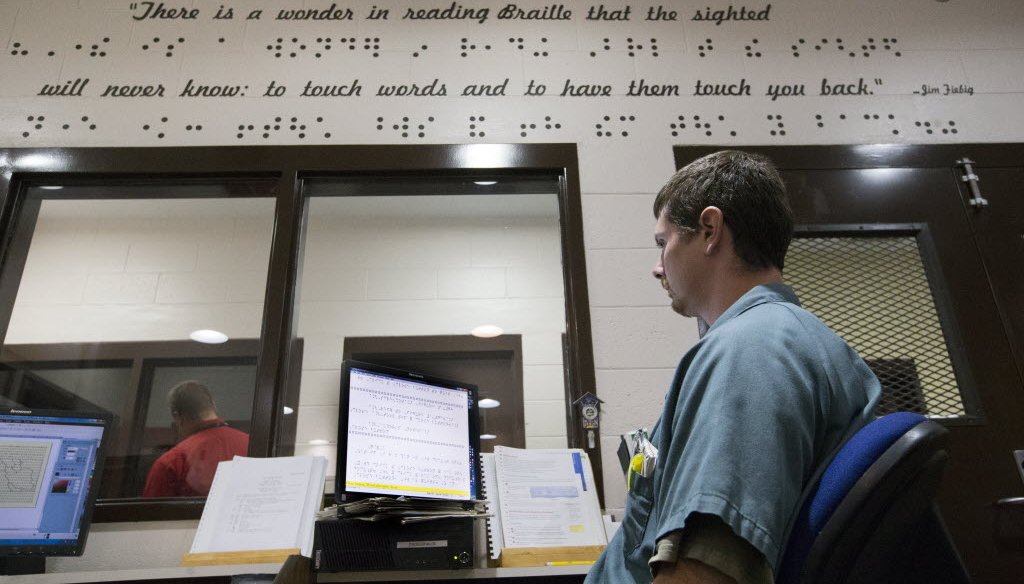

Our only agenda is to publish the truth so you can be an informed participant in democracy.
We need your help.


An inmate proofreads his work while transcribing books into braille for the blind at the Oshkosh Correctional Institution in Oshkosh, Wis. (Milwaukee Journal Sentinel/Mark Hoffman)
State Sen. Lena Taylor has made a promise for when the Wisconsin Legislature starts its next session, in January 2017.
"I am reintroducing my slavery ban," the Milwaukee Democrat declared.
Which suggests that slavery can be legal in Wisconsin -- a claim we want to check.
Here’s more of what Taylor said while making the pledge Oct. 13, 2016 in an opinion column headlined, "Legalized slavery in Wisconsin":
"There is absolutely no compelling reason for the State of Wisconsin to allow slavery. Period," Taylor wrote on Madison365.com, a site devoted to the Madison area’s communities of color. "But did you know slavery is still allowable under Wisconsin law as long as it’s a punishment for a crime?"
She added:
"I don’t care what you do or who you are, nobody deserves a life of enslavement. Nobody gets to own another person. I hope we can all agree on that. In practice, this amendment allows our prisons to exploit incarcerated individuals and force them to work without pay. Now I need to be clear on one thing – Wisconsin’s Department of Corrections does not currently use slave labor. But they could. And they would be fully within their legal rights to do so."
So, is "slavery" legal in Wisconsin "as long as it’s a punishment for a crime"?
Slavery in the news
Surprisingly, slavery was repeatedly in the news in Wisconsin in 2016. More surprisingly, each time it was due to a candidate for the state Supreme Court.
Now, let’s see how Taylor’s slavery statement stacks up on the Truth-O-Meter.
Wisconsin Constitution
To back her claim, Taylor cites the Wisconsin Constitution, which was approved by state voters in 1848.
Section 2 of Article 1, entitled "Slavery prohibited," says:
"There shall be neither slavery, nor involuntary servitude in this state, otherwise than for the punishment of crime, whereof the party shall have been duly convicted."
(Taylor says she will introduce a constitutional amendment that would end Section 2 at the word state. If the amendment passes the Legislature, which is controlled by Walker’s fellow Republicans, in the next two legislative sessions, it would go to voters in a referendum in 2020.)
Wisconsin’s Section 2 essentially mirrors the 13th Amendment to the U.S. Constitution, which abolished slavery.
"Neither slavery nor involuntary servitude, except as a punishment for crime whereof the party shall have been duly convicted, shall exist within the United States, or any place subject to their jurisdiction."
So, both constitutions ban slavery, but they specify an exception for the punishment of a convicted criminal.
Two Marquette University law professors whose specialties include constitutional law told us it is lawful for the Wisconsin Department of Corrections to force prison inmates to work without pay. But it’s not absolute.
Scott Idleman told us the work must be reasonably related to a legitimate penological interest, such as rehabilitation -- that is, it cannot be cruel and unusual, or arbitrary.
He also made the point that while slavery can be considered to be forced labor without pay, it is not the same as chattel slavery (people owned as property) that existed before the 13th Amendment.
His colleague Alan Madry provided a couple of examples. Requiring inmates to work in the prison laundry isn’t cruel and unusual, or arbitrary; cleaning up litter along the highway is probably within the law, too. Although there are no state Supreme Court opinions on how far the Department of Corrections could go, the department likely could not rent out inmates to private businesses to do work solely for the benefit of that business, he said.
The Department of Corrections told us prison inmates are not required to work. Those who work are paid 5 cents to $2 an hour, depending on the assignment.
The department sometimes requires inmates to work for no pay, but only as a penalty for violating prison rules.
Our rating
Referring to prison inmates, Taylor said: "Slavery is still allowable under Wisconsin law as long as it’s a punishment for a crime."
Prison inmates aren’t owned and they cannot be forced into labor based on skin color.
But slavery can also be considered as being forced into unpaid labor. And Wisconsin does have the legal authority to require inmates to work for no pay, although in practice it does so only when inmates violate prison rules.
We rate Taylor’s statement Mostly True.
https://www.sharethefacts.co/share/0848bdf3-e68f-4de8-9a7a-9cfbfec543a3Madison365.com, "Legalized slavery in Wisconsin," Oct. 13, 2016
Email, Sen. Lena Taylor spokesman Craig Trost, Nov. 10, 2016
Wisconsin Constitution, Article 1, Section 2: Slavery prohibited, accessed Nov. 11, 2016
Interview, University of Wisconsin-Madison professor of political science, law and journalism Donald Downs, Nov. 21, 2016
Email, Marquette University law professor Alan Madry, Nov. 21, 2016
The Atlantic, "American Slavery, Reinvented," Sept. 21, 2015
Newsweek, "Slavery is still legal in the United States," Aug. 25, 2015
Email, Wisconsin Department of Justice spokesman Johnny Koremenos, Nov. 21, 2016
Email, Wisconsin Department of Corrections spokesman Tristan Cook, Nov. 21, 2016
In a world of wild talk and fake news, help us stand up for the facts.
